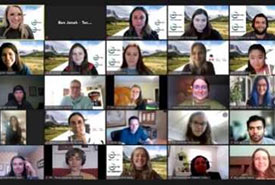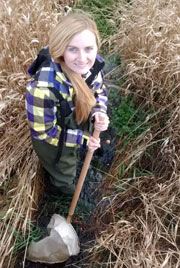Reflections, roundtables and royalty: Thoughts from attending the IUCN Global Youth Summit

A group photo of one session during the IUCN Youth Summit
There are not many reasons I will willingly get out of bed at 5:30 a.m., but the opportunity to make a real difference in the world is one of them.
Recently, I gathered with 13,000 fellow young people from across the globe at the International Union for Conservation of Nature’s (IUCN’s) One Nature, One Future, Global Youth Summit. This 10-day event, unlike anything the conservation community had seen before, was a virtual summit organized by youth, for youth, to talk about issues affecting youth.
The IUCN defines youth as people 18–35 years old, which puts me almost exactly at the midpoint of this movement. Halfway through my youth journey is a good time to pause and reflect. I want to be a driver for positive change in the conservation community.
At the Nature Conservancy of Canada (NCC), I lead eastern Ontario’s stewardship team as the coordinator of conservation biology. In my job, I contribute meaningfully and tangibly to the protection of some of Canada’s most at-risk species and habitats. Recently, I was honoured to be invited to sit on the Young Professionals Committee of the Canadian Committee for the IUCN (CCIUCN). This national role allows me to engage and empower fellow youth across Canada in their conservation journeys. NCC also has deep connections to the IUCN. We are a member organization, and our own vice-president of conservation policy and planning, Lisa McLaughlin, is the past chair of the CCIUCN board.
It’s impossible to sum up the sheer magnitude of the Global Youth Summit in one blog post, but as I reflect on my 10-day journey, I can group my experience into three pillars: learn, speak and act.
Learn
The most electrifying part of the Global Youth Summit was connecting with my peers from all walks of life and corners of the world. The summit offered hundreds of sessions. They took place at all times of the day, in 13 languages, and on a variety of environmentally themed topics. It was impossible to attend everything, as there was always something going on, but I packed my schedule starting at 5:30 a.m. to make sure I could learn as much as possible.
There were topics I directly live and experience every day (like the role of immigrants and women); there were topics I’m fiercely passionate about (like storytelling and Indigenous rights); and there were topics I’ve never fully considered (like sweatshops and fashion). Through plenary and round-table networking sessions, I learned from a variety of experts, youth leaders and policy makers. There was space for intergenerational dialogue, uncomfortable realization and inspirational storytelling as we celebrated the role youth play in the environmental movement.
Speak
The conference encouraged youth to speak up and have their voices heard. I took full advantage of this and dived passionately into every session I attended.
The feeling of being an imposter is something many youth relate to. We are all at the beginning of our conservation journeys and, unfortunately, there are people out there who don’t believe our opinions hold value. So, how do you step up and voice your truth when you feel like an outsider? It’s a question I’ve wondered for a while, so while on a panel with the Chairs of the IUCN Commissions, I asked them.
The irony of being nervous to ask a question about being nervous to ask questions wasn’t lost on me, but I received nothing but supportive, encouraging remarks about being proud of what I contribute. The summit did an excellent job of making space for diverse voices. There was space to celebrate achievements but also room to admit fault and work through challenges.
Throughout the 10 days, my confidence grew, and people from previous sessions started to notice me and reach out. In the panel discussion on empowering women, I asked for advice about navigating the discrimination that often comes with being a young woman who isn’t invited to sit at the table. The answer I got was “come back in through the window, and bring your own chair.”
I spoke with Indigenous knowledge holders, IUCN Commission Chairs, supermodels, youth activists, high school students and politicians. Every voice brought something new to the table. I even had a run-in with royalty. If I think back to where I thought the Global Youth Summit would take me, I can safely say the Princess of Belgium calling out my name and giving me personal life advice wasn’t anywhere on the list. This is what the Global Youth Summit gave me, and youth around the world: the opportunity to own our voices and take up space.
Act
Summarizing the Global Youth Summit feels daunting. I could write a novel about each individual session and the reflections I’ve had, but that’s why this movement is so great. I don’t have to do everything, because there are thousands of other young environmental leaders just like me speaking up across the world.
If you are a young professional, take action! Join the YouthCCNetwork, or a relevant Commission of the IUCN, and have your say in the global conservation community. A great place to start is the Young Canadian Professional Network for Conservation. You can find more information here.
If you don’t fall into the youth demographic, there is still a lot you can do, including becoming a member of CCIUCN. The leaders of tomorrow need mentors. We need guidance and the space for our voices to be heard. We want to collaborate with you and have an equal seat at the table. Ask yourself, what are you doing to make sure the youth in your life feel their voice is important?
For me, the biggest revelation from the Global Youth Summit is that my opinion matters. To have my voice sit on equal ground with industry experts, royalty and decision makers was powerful. But there is still a lot of work to do to authentically give youth a voice. The Global Youth Summit closed with an important message: This is only the beginning.
Watch for more information on the exciting work NCC and the CCIUCN are doing to advocate for youth. I truly believe that my generation can push the world in a positive direction, and from what I’ve seen over the last 10 days, the future is in good hands.


